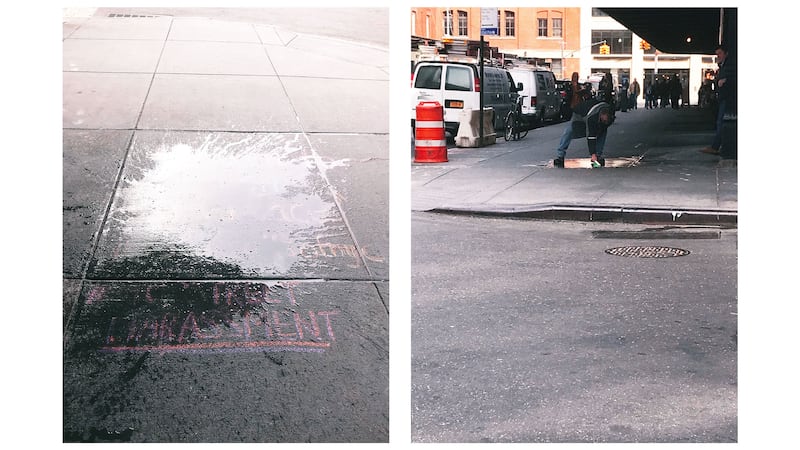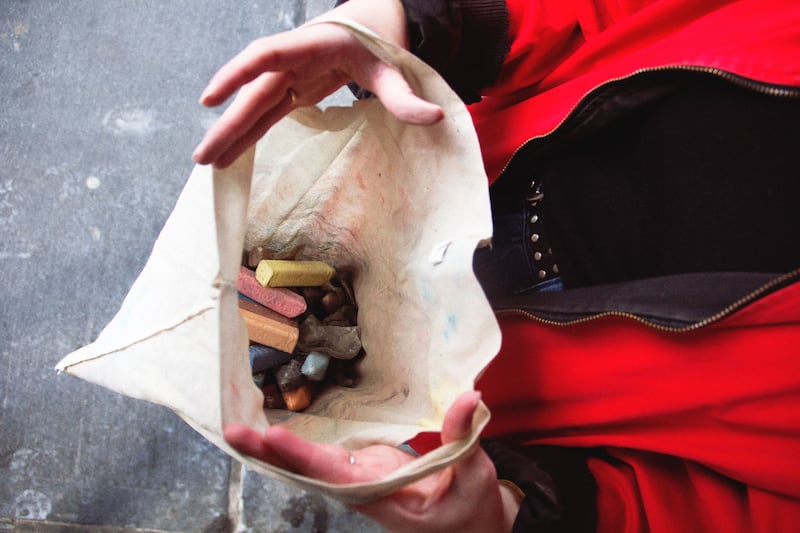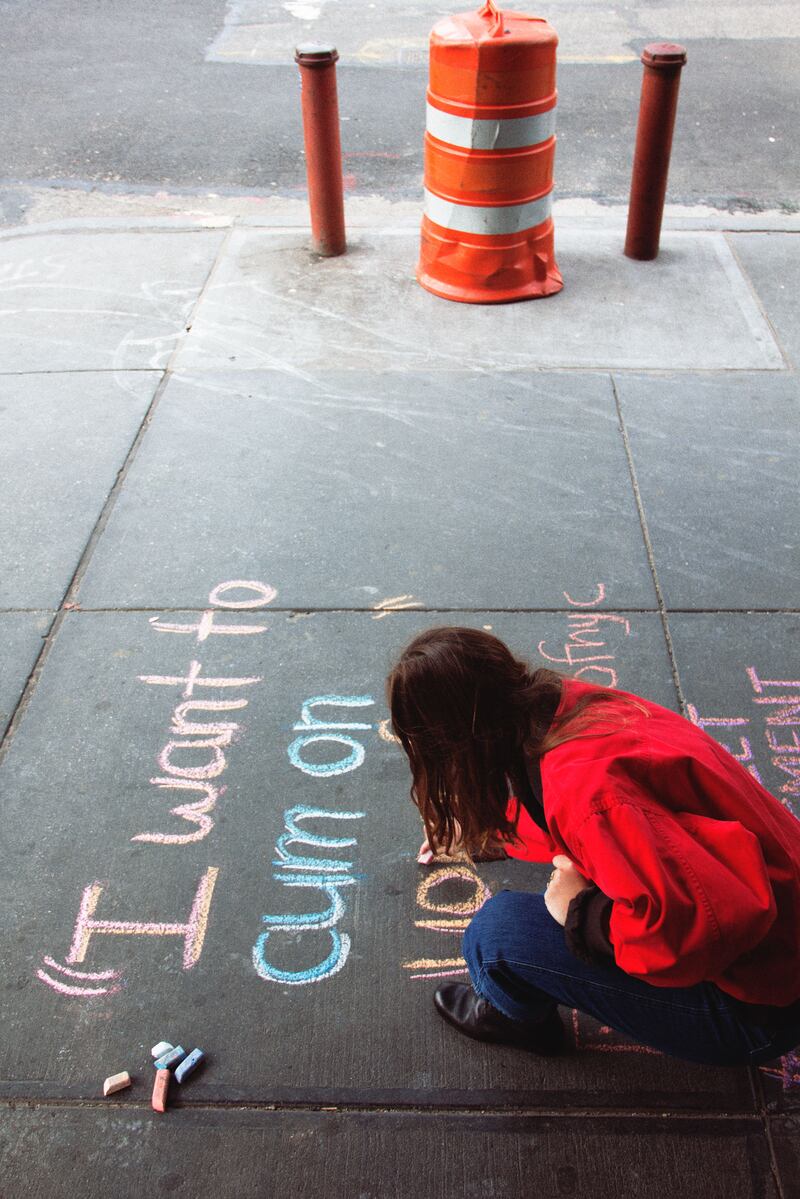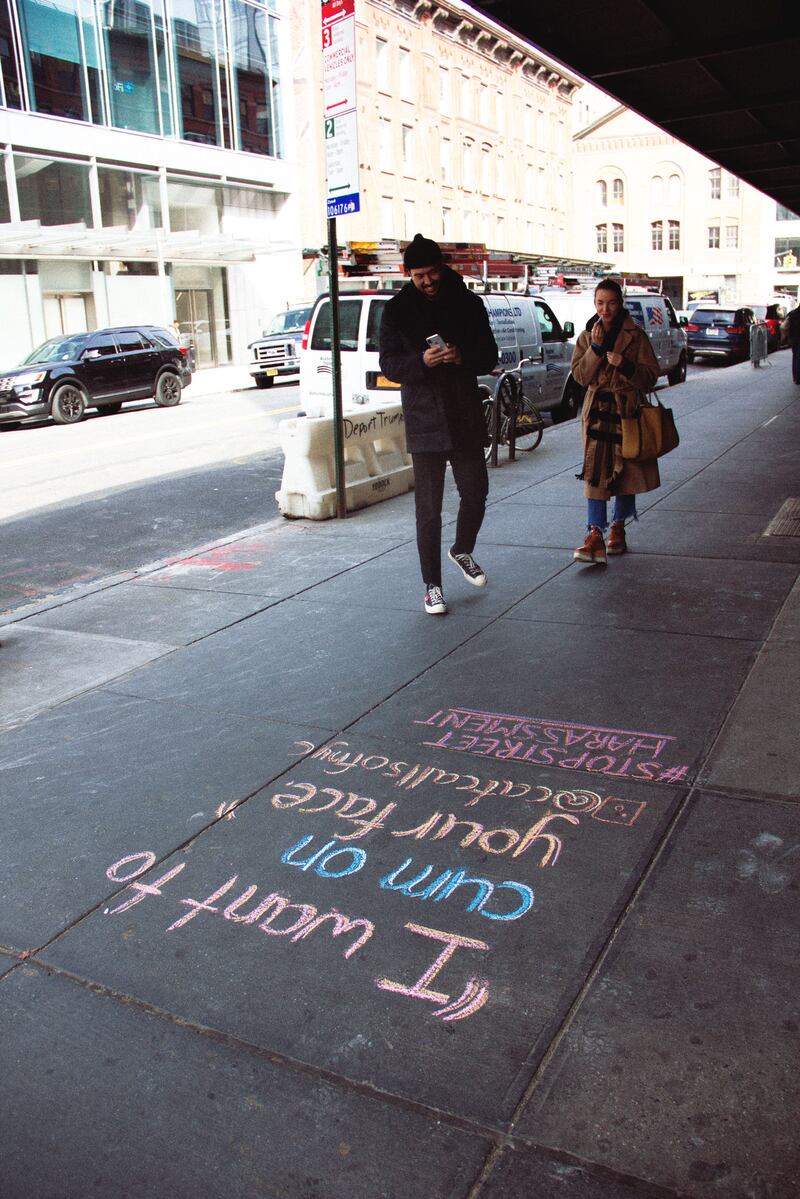For about 30 minutes on a sunny Friday morning, seven words forming a vulgar phrase all too familiar to many women were colorfully displayed on the sidewalk in Manhattan’s Meatpacking District.
Sophie Sandberg, a 21-year-old gender and sexuality studies major from NYU, is looking at her work, hands dusted with colorful residue left from chalking the words on the ground.
“I want to cum on your face,” it reads.
ADVERTISEMENT
She grabs more chalk—colors differing from what she’s already used—and outlines the words again. She then adds an Instagram handle and the hashtag, “#StopStreetHarassment” just below the quote.

“Someone sent me this one recently,” she says of the artful request. It came by way of a message through her popular Instagram, @CatcallsofNYC, an account dedicated to drawing attention to the street harassment women face daily.
“I was just outside The Strandard [sic] by the highline,” the message reads, “and a man, a much older man, looked me straight in the eyes and said, ‘I want to cum on your face’ I was so in shock I couldn’t move.”

As Sandberg finishes chalking, a few people stop and stare, both at her and the bright, colorful, and ugly words. Some ask questions. Others chuckle and continue on their way. A delivery man with a crate of boxes nearly crashes into her as she’s on her knees outlining the words once again, but notices her at the last moment and avoids collision. One couple takes a photo. One man walks right over it.
Ten minutes later, the words are gone. Splashed with a bucket of water and scrubbed off the sidewalk.

Sandberg posts her work and the watery remainders to her account. It now boasts nearly 4,000 likes, and a fiery debate about what it means to be a feminist and what constitutes harassment in the comment section.
Sandberg started Catcalls of NYC during her freshman year at NYU. She was given a general assignment in one of her classes: to immerse herself in something and document it on social media. She started collecting her own experiences and those of friends, but soon found that she wanted to diversify the experiences.
“My friends and I live in the same neighborhood, are similar in a lot of ways, and have a lot of the same experiences,” she explains. So she reached out to other accounts to let them know about her project and that she was looking for submissions. “It was really small at first, maybe 50 to 100 followers my first year and a half—but after the #MeToo movement started, that’s when it really took off,” and she began to reach a wider audience and receive submissions from all over New York City. She now has over 32,000 followers and her account has inspired many others around the globe.
“I have a spreadsheet of hundreds of catcalls and where they happened that I’ve put in chronological order,” she explains, saying that she tries not to “choose” but instead documents the experiences as she receives them. She admits, however, she likes to avoid repetition. “I try not to do the same catcall over and over again, but that doesn’t mean it doesn’t happen over and over again.”
Once someone shares a story, Sandberg goes to the location where the catcall occurred and chalks: she writes what was said, where it was said, in eye-catching and colorful writing. “There’s this bizarre contrast between chalk, which is played with by children, and the bright colors against these really vulgar words,” she says. “You see these colors and you think you’re going to see something light and fun, but then you see something that shocks and horrifies you. On a conceptual level, I wanted to illustrate how catcalls are seemingly a compliment but they feel so painful and uncomfortable.”

Sandberg was drawn to do something positive about street harassment because of personal experience, and the confusion and powerlessness that came along with it.
“I was 15, it was my first day of work at a summer job, and I had gotten dressed up. I had about a 10-minute walk from the subway to my office, and it felt like every single block, someone would say something to me.” The comments she heard were harmless on the surface level. “Good morning, sweetheart,” or a quick and emphatic, “Sexy!” There was nothing too profane. But, “I just felt so confused,” Sandberg says. “It just felt like my body wasn’t my own. They were taking control of me in a way that I had never experienced before.”

When Sandberg came home and told her parents about her experience, the advice she received—though meant with the best of intentions as a way to protect a young girl—is something all too commonly told to women: Try to dress down to avoid getting that much attention. “It was just more upsetting that I had to tailor my behavior to the harassment I was receiving,” Sandberg says.
In the moments of harassment, Sandberg describes herself feeling paralyzed. “I felt silenced because of the power structure,” she explains. But now, “I don’t allow it to affect me in the same way. I can ignore it because that’s the easiest way. But there are still times that I wish I could scream back or flip them off. But I often don’t feel comfortable or safe enough to do that.”
That’s where her Instagram page comes into play. “It's my way of addressing it and feeling empowered and like I can speak back against it. Maybe not in the moment, but after the fact.”

Much like women have become accustomed to toning out the crude comments barked their way during their everyday lives, many in our society have grown to drown out the #MeToo and #MeToo-adjacent conversations that have sprung up over the past year. The sheer volume of stories is often numbing and exhausting. But for Sandberg, the belittling of the #MeToo movement to just “talking” strikes a particularly sour note.
“It’s so much more than that,” she argues. “First of all, it feels good to tell your story. It’s a relief for people. Second,” she continues, “when people come together and share their experiences, we realize how much we have in common, we see the patterns, and that’s when we can turn the stories into something bigger.”
Though Sandberg has found there to be societal growth through the recent conversations, she also acknowledges the potential troubles with both the #MeToo movement, as well as her account.
“It’s not about getting that one person in trouble. Or getting that one guy fired,” she clarifies. “It’s about changing the way people think about gender, how they think about women on the street, and how they think about what’s acceptable.”
That hasn’t stopped people from feeling attacked and personally victimized by her documentation of others’ words. Some get angry at her while she chalks, asking how she has the gall to write those words on the sidewalk. Parents get upset that their children will see what is written. Someone called it graffiti. One man angrily exclaimed, "All those girls wearing tight clothes. I should have the right to say something to them with what they're wearing now-a-days." One older woman told Sandberg that she was the vandal, writing the filth on the street.

But with the bad, comes the promising. “I think it’s been very useful for people to share their stories and to be really honest about their experiences. That way,” she says, “hopefully some men understand the true point of what I’m doing. And I think they do.” One man even messaged her thanking her for her work, explaining he now sees how he can be a better ally.
“That’s the whole point. Just showing the things that can be improved upon. But I don’t get those frequently,” she admits, laughing. “There was just that one stellar man who said he had seen errors in his own behavior.”





